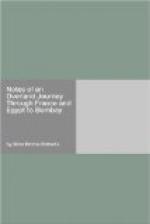Although a very good understanding exists between our Government and that of Makallah, which has for some time been a depot of coal for the use of the steamers, it is not advisable for visitors to proceed very far from the town without protection. A midshipman belonging to the Indian navy having gone on shore for the purpose of visiting the valley before-mentioned, and straying away to some distance, attracted by the beauty of the scenery, was suddenly surrounded by a party of Bedouins, who robbed him of all he possessed, cutting off the buttons from his clothes, under the idea that they were of gold—an impression which obtains all over the coast, and which inspired the people who made the last assault upon Aden with the hope of a rich booty.
The population of Makallah is estimated at about 4,600 people, of various tribes and countries, the chief portion being either of the Beni Hassan and Yafai tribes, together with Banians, Kurachies, and emigrants from nearly all parts of the adjacent coasts. It carries on rather a considerable trade in gums, hides, and drugs, which, with coffee, form the exports, receiving in return iron, lead, manufactured cloths, earthenware, and rice, from Bombay, and all the productions of the neighbouring countries, slaves included, in which the traffic is said to be very great.
The gentlemen who went on shore purchased very pretty and convenient baskets, wrought in various colours, and also quantities of sweetmeats, which are much in esteem in India; these are composed of honey and flour, delicately made, the honey being converted into a soft kind of paste, with a coating of the flour on the outside. These sweetmeats were nicely packed in straw baskets, of a different manufacture from those before-mentioned, and were very superior to the common sort which is brought from the coast in small coarse earthenware basins, exceedingly unattractive in their appearance.
The interior of the country is said to be very beautiful, abundantly watered by refreshing springs, and shaded by groves of date-trees. Amongst its animal productions, the most beautiful is the gazelle, which, properly speaking, is only to be found in Arabia; a delicate and lovely creature, with the soft black eye which has been from time immemorial the theme of poets. The gazelle is easily tamed, becoming in a short time very familiar, and being much more gentle, as well as more graceful, than the common antelope. Its movements are the most airy and elegant imaginable. It is fond of describing a circle in a succession of bounds, jumping off the ground on four legs, and touching it lightly as it wheels round and round. At other times, it pirouettes upon the two fore feet, springing round at the same time like an opera-dancer; in fact, it would appear as if Taglioni, and all our most celebrated artistes, had taken lessons from the gazelle, so much do their chefs-d’oeuvre resemble its graceful motions. When domesticated,




